
Earlier this year we submitted our ambitious carbon reduction targets to the independent Science Based Targets initiative (SBTi), a partnership between the UN Global Compact, the World Resources Institute (WRI), CDP and WWF. The SBTi assessed Greenyard’s carbon commitments, the methodology and target setting against the Paris Climate Agreement – limiting global warming to 1.5°C.
After careful examination, SBTi has now certified our targets. Which are? Reducing our direct (scope 1 & scope 2) emissions by 70% in 2030 compared to the base year 2020, as well as our indirect (scope 3) emissions. For these scope 3 emissions, we want to encourage our largest suppliers to also commit to science-based climate targets. This approach should cover 70% of the purchase value of our goods and services by 2026, including the related inbound and outbound transport and distribution movements.
How do we plan to lower our emissions by 70%? Via a range of actions, such as: testing fuel saving truck tires and fuel types, a full electric lease policy and systematically replacing cooling installations with more sustainable alternatives. To tackle indirect emissions, we are working closely together with our partners and suppliers throughout chain. Including our grower network, as they use machinery and fertilizers at their farms but also provide packaging and transport services.
